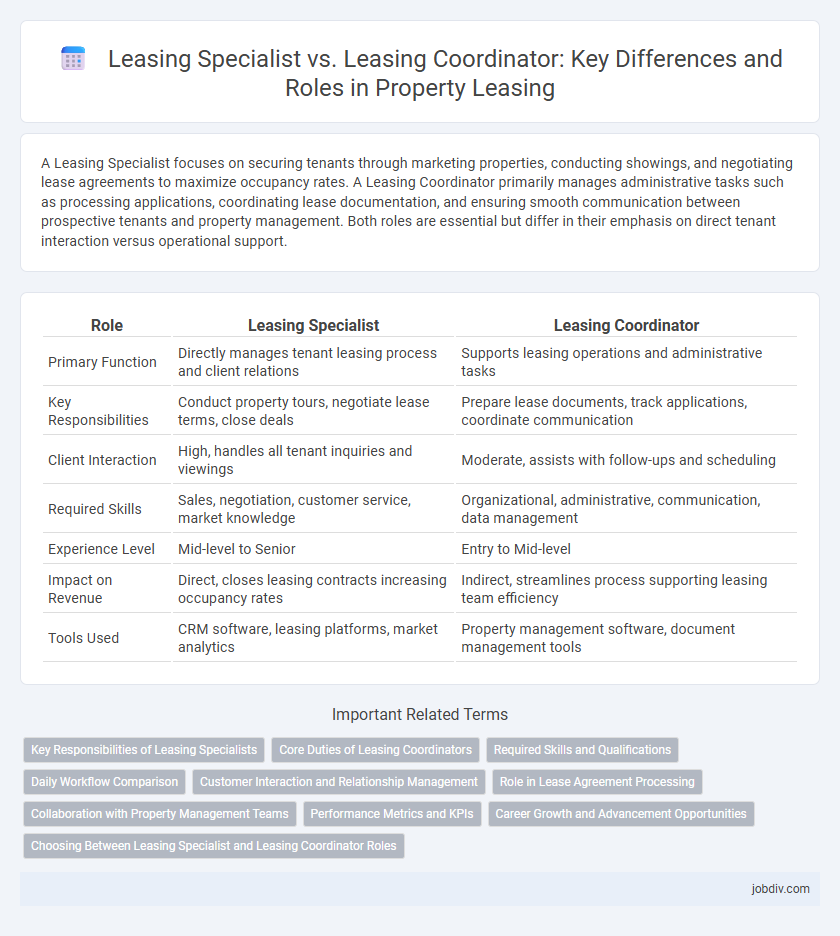A Leasing Specialist focuses on securing tenants through marketing properties, conducting showings, and negotiating lease agreements to maximize occupancy rates. A Leasing Coordinator primarily manages administrative tasks such as processing applications, coordinating lease documentation, and ensuring smooth communication between prospective tenants and property management. Both roles are essential but differ in their emphasis on direct tenant interaction versus operational support.
Table of Comparison
| Role | Leasing Specialist | Leasing Coordinator |
|---|---|---|
| Primary Function | Directly manages tenant leasing process and client relations | Supports leasing operations and administrative tasks |
| Key Responsibilities | Conduct property tours, negotiate lease terms, close deals | Prepare lease documents, track applications, coordinate communication |
| Client Interaction | High, handles all tenant inquiries and viewings | Moderate, assists with follow-ups and scheduling |
| Required Skills | Sales, negotiation, customer service, market knowledge | Organizational, administrative, communication, data management |
| Experience Level | Mid-level to Senior | Entry to Mid-level |
| Impact on Revenue | Direct, closes leasing contracts increasing occupancy rates | Indirect, streamlines process supporting leasing team efficiency |
| Tools Used | CRM software, leasing platforms, market analytics | Property management software, document management tools |
Key Responsibilities of Leasing Specialists
Leasing Specialists manage tenant relations, conduct property tours, and prepare lease agreements to ensure smooth tenant onboarding and retention. They analyze market trends to set competitive rental rates and collaborate with property management to optimize occupancy rates. Leasing Specialists also handle lease renewals and resolve tenant concerns, enhancing overall tenant satisfaction and property profitability.
Core Duties of Leasing Coordinators
Leasing Coordinators primarily manage administrative tasks such as processing lease applications, coordinating lease signings, and maintaining accurate tenant records to ensure seamless leasing operations. They serve as the key communication link between prospects, tenants, and leasing specialists, facilitating smooth onboarding and lease renewals. Their core duties emphasize organization, documentation accuracy, and supporting the leasing team in driving tenant satisfaction and operational efficiency.
Required Skills and Qualifications
Leasing Specialists require strong negotiation skills, in-depth knowledge of property management software, and expertise in tenant relations to effectively close leases and manage client inquiries. Leasing Coordinators must possess excellent organizational abilities, proficiency in administrative tasks such as lease documentation and scheduling, and strong communication skills to support leasing operations. Both roles demand attention to detail, customer service proficiency, and familiarity with leasing regulations and property market trends.
Daily Workflow Comparison
Leasing Specialists primarily focus on client interactions, property showings, and lease agreement negotiations, ensuring tenant satisfaction and occupancy rates. Leasing Coordinators manage administrative tasks, such as processing applications, maintaining lease records, and coordinating communications between property managers and tenants. Both roles are crucial for smooth leasing operations, with Specialists emphasizing external engagement and Coordinators ensuring internal workflow efficiency.
Customer Interaction and Relationship Management
Leasing Specialists excel in direct customer interaction, handling tours, lease negotiations, and addressing tenant inquiries to build strong, personalized relationships. Leasing Coordinators focus on managing back-end processes such as application processing, document preparation, and coordinating communication between tenants and property managers to ensure smooth leasing workflows. Both roles contribute to relationship management but differ in frontline engagement versus operational support.
Role in Lease Agreement Processing
A Leasing Specialist manages lease agreement processing by negotiating terms, verifying tenant information, and ensuring compliance with legal standards to finalize contracts efficiently. In contrast, a Leasing Coordinator supports the process by organizing documentation, tracking lease statuses, and facilitating communication between tenants and property management teams. Both roles are essential for seamless lease execution but differ in responsibility scope, with specialists handling strategic negotiations and coordinators focusing on administrative support.
Collaboration with Property Management Teams
Leasing Specialists work closely with property management teams to attract and retain tenants through targeted marketing strategies and thorough lease negotiations. Leasing Coordinators support this collaboration by managing administrative tasks, coordinating property tours, and ensuring seamless communication between prospective tenants and property managers. Both roles are essential for maintaining efficient leasing operations and fostering strong tenant relationships.
Performance Metrics and KPIs
Leasing Specialists are measured primarily by lease conversion rates, tenant satisfaction scores, and monthly occupancy growth, reflecting their direct impact on leasing activity and client relations. Leasing Coordinators focus on process efficiency metrics such as lease documentation accuracy, turnaround time for lease approvals, and internal communication effectiveness, ensuring smooth operational flow. Both roles contribute essential KPIs that collectively enhance property leasing performance and revenue optimization.
Career Growth and Advancement Opportunities
Leasing Specialists typically manage client relations and lease negotiations, offering direct experience in sales and customer service that enhances career growth toward senior leasing or property management roles. Leasing Coordinators support administrative processes and facilitate lease documentation, providing foundational skills useful for advancement into property management or real estate administration. Both positions serve as critical stepping stones, with Leasing Specialists often moving faster into client-facing leadership roles, while Leasing Coordinators build operational expertise valuable for broader property management career paths.
Choosing Between Leasing Specialist and Leasing Coordinator Roles
Choosing between a Leasing Specialist and a Leasing Coordinator depends on your career goals and preferred responsibilities within property management. Leasing Specialists focus on direct client engagement, handling lease negotiations, and closing rental agreements, while Leasing Coordinators manage administrative duties, schedule property showings, and support leasing teams. Evaluating your strengths in sales versus organizational skills helps determine the best fit for advancing in the leasing industry.
Leasing Specialist vs Leasing Coordinator Infographic

 jobdiv.com
jobdiv.com